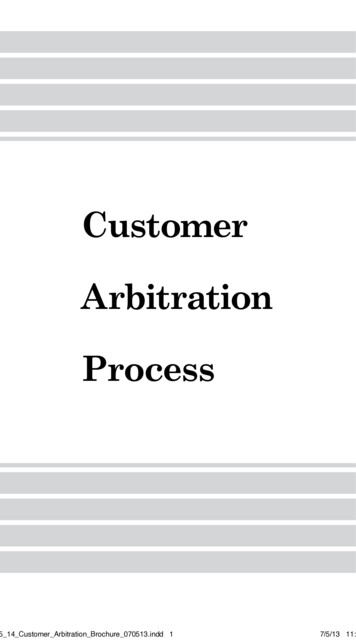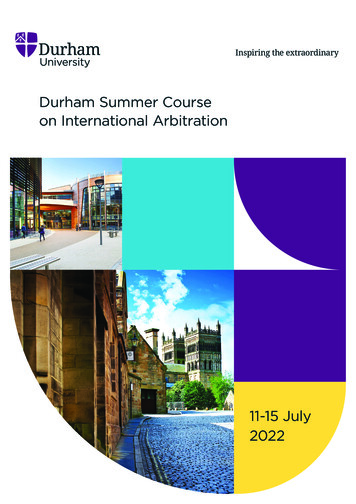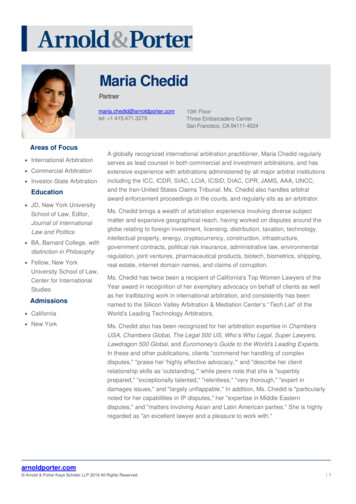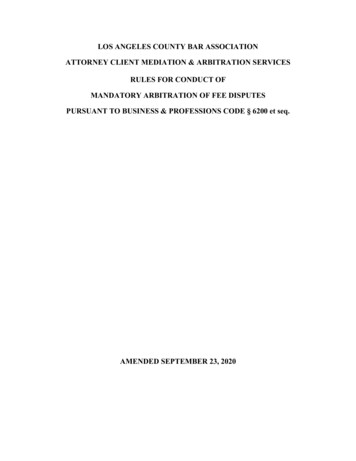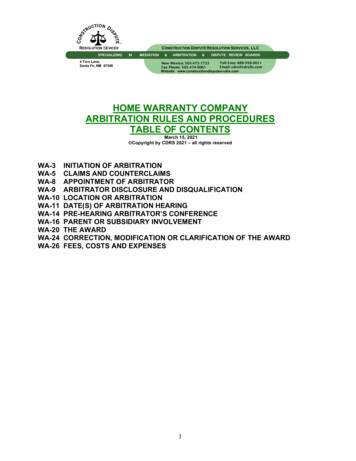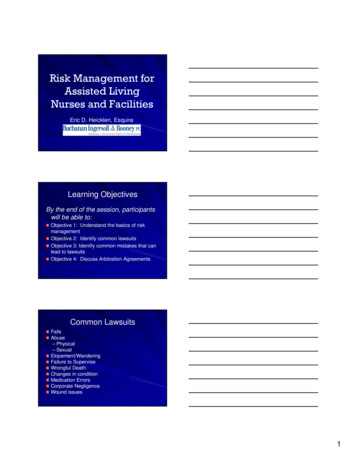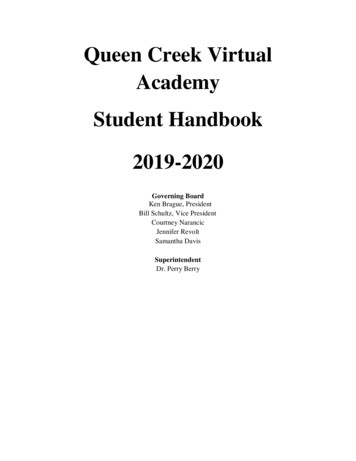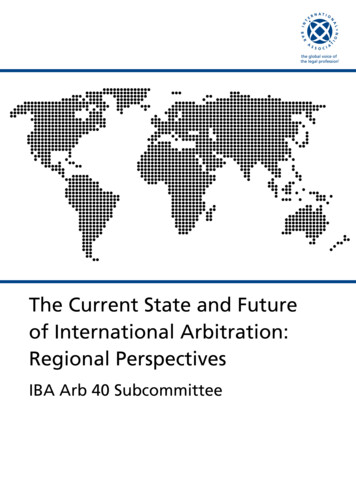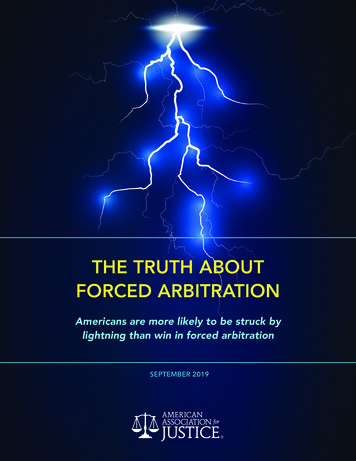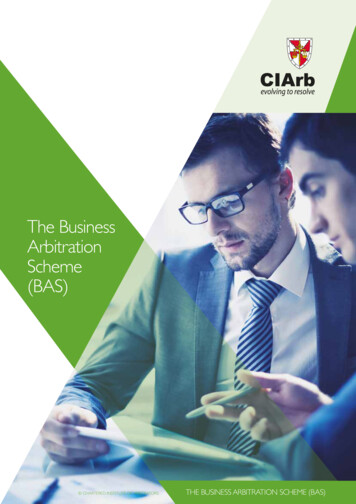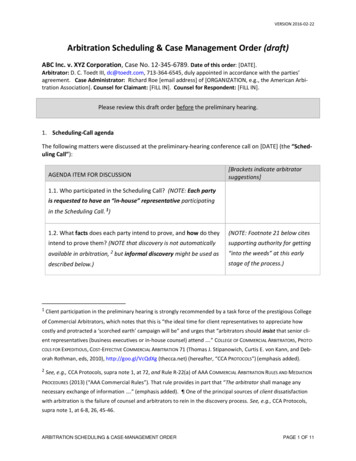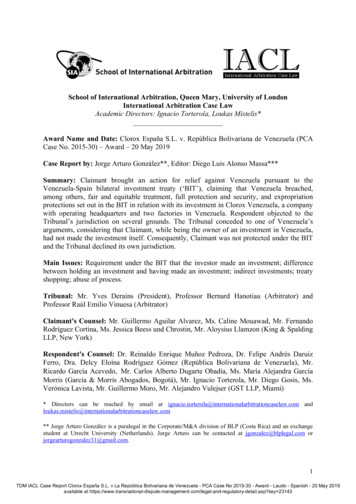
Transcription
School of International Arbitration, Queen Mary, University of LondonInternational Arbitration Case LawAcademic Directors: Ignacio Torterola, Loukas Mistelis*Award Name and Date: Clorox España S.L. v. República Bolivariana de Venezuela (PCACase No. 2015-30) – Award – 20 May 2019Case Report by: Jorge Arturo González**, Editor: Diego Luis Alonso Massa***Summary: Claimant brought an action for relief against Venezuela pursuant to theVenezuela-Spain bilateral investment treaty (‘BIT’), claiming that Venezuela breached,among others, fair and equitable treatment, full protection and security, and expropriationprotections set out in the BIT in relation with its investment in Clorox Venezuela, a companywith operating headquarters and two factories in Venezuela. Respondent objected to theTribunal’s jurisdiction on several grounds. The Tribunal conceded to one of Venezuela’sarguments, considering that Claimant, while being the owner of an investment in Venezuela,had not made the investment itself. Consequently, Claimant was not protected under the BITand the Tribunal declined its own jurisdiction.Main Issues: Requirement under the BIT that the investor made an investment; differencebetween holding an investment and having made an investment; indirect investments; treatyshopping; abuse of process.Tribunal: Mr. Yves Derains (President), Professor Bernard Hanotiau (Arbitrator) andProfessor Raúl Emilio Vinuesa (Arbitrator)Claimant's Counsel: Mr. Guillermo Aguilar Alvarez, Ms. Caline Mouawad, Mr. FernandoRodríguez Cortina, Ms. Jessica Beess und Chrostin, Mr. Aloysius Llamzon (King & SpaldingLLP, New York)Respondent's Counsel: Dr. Reinaldo Enrique Muñoz Pedroza, Dr. Felipe Andrés DaruizFerro, Dra. Delcy Eloína Rodríguez Gómez (República Bolivariana de Venezuela), Mr.Ricardo García Acevedo, Mr. Carlos Alberto Dugarte Obadía, Ms. María Alejandra GarcíaMorris (García & Morris Abogados, Bogotá), Mr. Ignacio Torterola, Mr. Diego Gosis, Ms.Verónica Lavista, Mr. Guillermo Moro, Mr. Alejandro Vulejser (GST LLP, Miami)* Directors can be reached by email at com .com** Jorge Arturo González is a paralegal in the Corporate/M&A division of BLP (Costa Rica) and an exchangestudent at Utrecht University (Netherlands). Jorge Arturo can be contacted at jgonzalez@blplegal.com orjorgearturogonzalez31@gmail.com.1TDM IACL Case Report Clorox España S.L. v La República Bolivariana de Venezuela - PCA Case No 2015-30 - Award - Laudo - Spanish - 20 May 2019available at egal-and-regulatory-detail.asp?key 23143
Lawyer, University of Buenos Aires, admitted to practice law in the City of Buenos Aires; Sworn Translator, Universityof Buenos Aires, Argentina. LLM holder in International Relations – with a specialization in Private International Law –Institut de Hautes Études Internationales, University of Geneva, Switzerland; Ph.D. candidate at the Université du Québec àMontréal (UQAM). Mr. Alonso Massa can be contacted at: alonso@arbitrage-transnational.comDigest:1. Relevant FactsClorox Spain S.L. (‘Clorox Spain’ or ‘Claimant’) is a company incorporated under the lawsof the Kingdom of Spain. Respondent is the Republic of Venezuela (‘Venezuela or‘Respondent’) (¶ 2). Since 2011 Clorox Spain had ownership over Clorox Venezuela, asubsidiary operating in that country with a headquarters office and two factories. Up to 2011,Clorox Venezuela had been operating with a 40% average gross margin and a 20% averageoperating margin (¶ 438). However, in November 2011, Venezuela froze the prices of theproducts that accounted for 73% of Clorox Venezuela’s sales. In 2014 Venezuela reaffirmedthe price control regulation (¶ 438). Further, Venezuela restricted the management of CloroxVenezuela by forbidding the possibility of laying off employees, retaining tax credits owed tothe company under the Value Added Tax regime, and restricting access to foreign currencies(¶ 440). In 2014 Clorox Venezuela sustained a loss of 14.1 million US dollars (¶ 438). Thecompany ceased operations on September 22, 2014 (¶ 441). Venezuela took over the factoriesof Clorox Venezuela on 26 September 26, 2014, named a new Board of Directors, and soldits former products under a modified logo, which included the label “Made in Socialism” (¶442).Claimant brought an action for relief against Venezuela pursuant to the BIT, alleging thatVenezuela breached, inter alia, fair and equitable treatment, full protection and security, andexpropriation protections in the BIT.2. Procedural HistoryClaimant filed a Notice of Arbitration (‘NoA’) on May 18, 2015. Respondent received theNoA on the same date; pursuant to the UNCITRAL Arbitration Rules, the arbitration wasdeemed to have commenced on that date (¶¶ 4-6). Claimant appointed Professor BernardHanotiau as arbitrator in the NoA (¶ 8). Respondent appointed Professor Raúl EmilioVinuesa on June 17, 2015 (¶ 9). The Secretary General of the Permanente Court ofArbitration (‘PCA’) appointed Mr. Yves Derains as presiding arbitrator (¶ 10). The partiesagreed that the seat of the arbitration was Geneva, Switzerland (¶ 23) and that the language ofthe proceedings was Spanish (¶ 13).On April 20, 2017, the pre-hearing conference call took place (¶ 89). The hearing was heldfrom May 22 to May 26, 2017 (¶ 115). The Tribunal considered exhibit C-190 to beinadmissible after failing to verify its authenticity through the appointment of an expert (¶195).2TDM IACL Case Report Clorox España S.L. v La República Bolivariana de Venezuela - PCA Case No 2015-30 - Award - Laudo - Spanish - 20 May 2019available at egal-and-regulatory-detail.asp?key 23143
3. Positions of the Parties on Jurisdiction3.1 Respondent’s Position3.1.1 Claimant did not meet its burden of proofRespondent submits that the burden of proof regarding the tribunal’s jurisdiction when thefacts are object of debate falls upon the claimant, as recognized by several investmentarbitration tribunals. The jurisdiction must be clear, certain and proven. In this sense,Respondent alleges that the Claimant is not even remotely close to satisfactorily dischargingthis burden, and consequently, the Tribunal has to decline its jurisdiction (¶¶ 206-208).3.1.2 Claimant is not an investor under the BITThe applicable BIT only covers investments made by nationals or companies of a ContractingState in the territory of the other Contracting State (¶ 212). Further, under the BIT, the assetsthat constitute the investment must have been invested by the foreign investor (¶¶ 212, 225).This stems from article I of the BIT, which must be interpreted according to the ViennaConvention on the Law of the Treaties (‘the Vienna Convention’) (¶ 227). Under the ViennaConvention, a treaty shall be interpreted in good faith in accordance with the ordinarymeaning to be given to its terms in their context and in the light of its object and purpose (¶227). According to article 1.2 of the BIT any kind of assets invested by investors of aContracting State in the territory of the other Contracting State are considered an investment(¶ 230). Considering the purpose of the BIT, Respondent shows that, pursuant to thepreambles of the BIT, it aims to protect real investors from one of the Contracting States thatcarry out real investments in the other Contracting State (¶ 234). According to the Quiboraxv. Bolivia case, being the owner of an investment i.e., shares, is not enough, but the action ofinvesting is necessary (¶¶ 229, 231).The action of investing never took place in this case, as Clorox Spain did not carry out aninvestment in Venezuela (¶¶ 212, 231). The true investment was that of The CloroxInternational Company (‘Clorox International’), an American company that is not protectedby the BIT (¶¶ 210, 212), as the US does not have a BIT with Venezuela (¶ 286). Claimantnever purchased the shares of Clorox Venezuela, but they were rather fraudulently transferredas part of an abuse of process, as explained below (¶ 228).Respondent submits that the true investor is Clorox International. With the sole purpose ofprotecting its investment under the BIT, Clorox International incorporated Clorox Spain, andon the same day of incorporation, transferred all of the shares of Clorox Venezuela to CloroxSpain through a supposed barter agreement (¶ 210). This constitutes a fraud, which was onlyplanned with the purpose of seeking protection under the BIT (¶ 211). At this moment, thedispute was already foreseeable (¶ 214).Clorox Spain is a shell company and its sole purpose is to hold the shares of CloroxVenezuela for Clorox International (¶ 213). According to Respondent, Clorox Internationaladmitted that the purpose of incorporating Clorox Spain was to carry out a corporatereorganization that would allow it to begin an international arbitration proceeding againstRespondent (¶¶ 214, 292).3TDM IACL Case Report Clorox España S.L. v La República Bolivariana de Venezuela - PCA Case No 2015-30 - Award - Laudo - Spanish - 20 May 2019available at egal-and-regulatory-detail.asp?key 23143
The only element linking Claimant to Spain is its registered address (¶¶ 215-216). Theemployees of Clorox Venezuela have no knowledge of Clorox Spain (¶ 217). Claimant hasnever been involved in the management of Clorox Venezuela, whereas the directors ofClorox International have (¶¶ 217, 221-222). When Clorox Venezuela stopped operations,Clorox International issued a press release (¶ 223).Claimant has not provided evidence of wire transfers or any type of contribution, in cash or inkind, carried out in Venezuela (¶ 217). Clorox International remains the true shareholder inClorox Venezuela’s corporate structure, as Clorox Spain is nothing more than a papercompany (¶¶ 218-219). From 2012 onwards, the employees of Clorox Venezuela used thedistinctive logo of Clorox International (¶ 220).3.1.3 Claimant engaged in an abuse of processRespondent restates that the alleged investment is not protected by the BIT (¶ 237). Eventhough the BIT recognizes shares as an investment, the investor must have carried out theaction of investing (¶ 237). Claimant did not purchase the shares, has not shown a sale andpurchase agreement, or proven the payment of a price for the shares (¶ 239). All of the sharesof Clorox Venezuela were transferred by Clorox International to Clorox Spain as a capitalcontribution in kind upon the latter’s incorporation (¶ 239). Clorox Spain had a recordedcapital stock of 3,000 euros, whereas Clorox Venezuela, its subsidiary, was worth 14 millionUS dollars (¶ 242). Even if Clorox Venezuela made a contribution of know-how ortechnology to Venezuela, this is irrelevant, as it is Clorox Spain that would have had to makethis investment to qualify as an investor under the BIT (¶ 243). No evidence of suchinvestment has been found (¶ 243).An abuse of process takes place when a company that can prima facie invoke a right, behavesin such a way as to distort the rationale behind such right and consequently loses it (¶ 245).This definition refers to a procedural right, such as the alleged investor’s right to access thedispute resolution mechanisms found in the BIT (¶ 245). The sole purpose behind thecreation of Clorox Spain was for the present dispute to fall under the umbrella of the BIT (¶244).A corporate reorganization that aims to obtain the protection of a BIT is not necessarilyillegitimate or abusive (¶ 247), but if such reorganization takes place after the disputebecomes reasonably foreseeable, then it ranks as abusive and illegitimate (¶¶ 248-250).According to Respondent, the Tribunal should consider whether the corporate reorganizationstands on its own, independently of granting access to the BIT (¶ 291).Foreseeability is not a mere possibility (¶ 251), but rather, a reasonable prospect that ameasure which may give rise to a treaty claim will materialize, according to Philip Morris v.Australia (¶ 252).Claimant states that the moment when the dispute originated was when the price controlregulation was enacted on July 18, 2011 (‘Price Regulation Law’) (¶ 254). Clorox Spain wasincorporated before this date, on April 15, 2011 and received the shares of Clorox Venezuelaon the same day (¶ 254). According to this timeline, presented by Claimant, the corporatereorganization was not abusive and was unrelated to the dispute (¶ 254). However, accordingto Respondent, Clorox Spain did not become a shareholder of Clorox Venezuela until August3, 2011 when the Shareholders’ Meeting of Clorox Venezuela approved the acquisition of its4TDM IACL Case Report Clorox España S.L. v La República Bolivariana de Venezuela - PCA Case No 2015-30 - Award - Laudo - Spanish - 20 May 2019available at egal-and-regulatory-detail.asp?key 23143
stock by Clorox Spain (¶¶ 258, 259). As a result, Claimant’s status as an alleged investorunder the BIT did not take place before the origin of the dispute (¶ 260).However, even if Claimant in fact became an investor on the date of its incorporation, thedispute was already reasonably foreseeable at this moment, as the President of Venezuela hadannounced the creation of the Superintendence of Prices and Costs (‘Superintendence’) andthe forthcoming Price Regulation Law (¶ 263). This shows that the corporate reorganizationwas abusive. By comparison, these facts are much clearer than those of Philip Morris v.Australia, where there was great political instability and debate regarding the regulation oftobacco (¶¶ 265, 266). Claimant omitted these crucial facts, but also, the existence of a pricecontrol regime affecting the exact same products manufactured by Claimant, since 1994 (¶¶269-274). Further, Clorox International had objected to these regulations in the past (¶ 283).All the other grievances allegedly faced by Claimant were also foreseeable, or even foreseenby the time of Claimant’s incorporation, and are intertwined with the matter of priceregulation (¶¶ 277-279, 284). For instance, Clorox Venezuela had complained about thedifficulty to obtain foreign currencies (¶¶ 280-281). Another element to take intoconsideration in this foreseeability test is that, since 1997, labor legislation and practiceordered to reinstate the business operation of a company when massive layoffs took place (¶282).Bad faith does not have to be proven to show that an abuse of process was committed (¶ 285).Nonetheless, the deceptive conduct of Claimant must weigh in on the Tribunal’s decision (¶285).3.1.4 Claimant engaged in treaty shopping and its corporate veil should be liftedRespondent submits that corporate planning must be justified by economic or commercialmotives, while treaty shopping is not adequate in this sense (¶ 299). Whether Claimant hasemployees or a real business operation has not been proven (¶ 300). As this is a case of treatyshopping, Claimant’s corporate veil should be lifted, in order to ascertain that the ultimatebeneficiary of the investment is Clorox International (¶ 302). Clorox Spain is a facade and thetrue nationality of the investor should prevail (¶¶ 303-304)Respondent is certain that Claimant’s incorporation was a response to the arbitral award ofJune 10, 2010, concerning Mobil v. Venezuela, where it was established that an ICSIDtribunal lacked jurisdiction to hear a claim raised by an American Company (¶ 305). ICSIDcase law supports the argument that a corporate reorganization is abusive if it takes placeafter the dispute becomes reasonably foreseeable (¶ 306).3.2 Claimant’s Position3.2.1 Respondent did not prove its affirmative defenseThe burden of proof regarding fraud and abuse of process falls upon Respondent; there is ahigh threshold which is not met on the facts of this case (¶¶ 320, 323, 325). Claimant hasproven that it is a Spanish investor and that the dispute refers to its investment in Venezuela(¶ 321), qualifying as an investor under article I(1)(b) of the BIT (¶ 313). Claimant’saffirmative defenses regarding fraud and abuse of process must be clearly proven to succeed,but there is no evidence supporting them (¶¶ 326, 329).5TDM IACL Case Report Clorox España S.L. v La República Bolivariana de Venezuela - PCA Case No 2015-30 - Award - Laudo - Spanish - 20 May 2019available at egal-and-regulatory-detail.asp?key 23143
3.2.2 Claimant is an investor under the BITClaimant is a Spanish company and owns 100% of the stock of Clorox Venezuela, aVenezuelan company (¶ 333). Under the BIT, companies can be considered investors (¶ 334).The BIT does not require that the investor is involved in the management of the investmentor that it carries out business operations in its home country (¶ 335). These additionalrequirements alleged by Respondent do not stem from the BIT (¶¶ 335, 336). Other BITssigned by Respondent do impose similar additional requirements (¶¶ 336-339). However, as amatter of fact, Claimant was involved in the management of Clorox Venezuela; for instance,Claimant appointed directors and approved the financial statements of Clorox Venezuela asits sole shareholder (¶ 351).The BIT does not preclude Claimant from becoming a protected investor by acquiring theshares of Clorox Venezuela, rather than making the initial contribution (¶ 340). The BITexpressly recognizes shares as an example of an investment (¶¶ 341, 349). The BIT does notcontain a denial of benefits provision, which would allow the Contracting Statesto deny the benefits of the treaty to a company that is ultimately controlled by nationals of athird State (¶¶ 343-344).Claimant criticizes Respondent’s argument that holding shares of a Venezuelan company isnot enough to be considered an investor (¶ 356). The case law supporting Respondent’sposition stems from ICSID cases which are inapplicable (¶ 358). Further, it is evident that theinvestment in this case, i.e. Clorox Venezuela, is within the territory of Venezuela (¶ 362).Pursuant to all of the above, Claimant is undoubtedly an investor under the BIT (¶ 345).3.2.3 Claimant did not engage in an abuse of processClaimant rebuts Respondent’s argument that Clorox Spain was created and acquired theshares of Clorox Venezuela only when the dispute was already foreseeable (¶ 374). Even ifprice regulation was a foreseeable policy, Claimant could not have foreseen that theSuperintendence was going to exercise its discretionary powers arbitrarily (¶ 375). Further,the present dispute did not begin until September 2014, years after Claimant’s incorporationand its acquisition of Clorox Venezuela (¶ 380). Finally, the dispute was not foreseeable evenin 2011 (¶ 381). In this sense, Claimant’s incorporation is not abusive (¶ 376).Claimant defines abuse of law as a State taking advantage of its rights arbitrarily, causingunjustified damage to the other State (¶ 382). In this sense, Claimant defined an abuse ofprocess as the act of using a procedural instrument to achieve results that are not consistentwith the ratio legis of procedural laws (¶ 382).Claimant concedes that, if the corporate reorganization had taken place after the dispute hadbegun, then it would have been abusive (¶ 383). On the contrary, “nationality planning” maybe justified (¶ 384). In this regard, Claimant states that at the time of the corporatereorganization, there were no signs of the dispute. While conceding that price regulationexisted before 2011, Claimant argues that the controversy arises from the adoption of drasticmeasures in 2012, which were considerably different than the Price Regulation Law of 2011and any prior regulations (¶¶ 386, 391). Before 2012, on average Clorox Venezuela operatedwith a 40% gross margin and a 20% operating margin (¶ 389). In 2012, Venezuela beganfixing prices arbitrarily, disregarded Claimant’s comments, failed to compensate aggrieved6TDM IACL Case Report Clorox España S.L. v La República Bolivariana de Venezuela - PCA Case No 2015-30 - Award - Laudo - Spanish - 20 May 2019available at egal-and-regulatory-detail.asp?key 23143
companies and suddenly broadened the scope of the regulation (¶ 390). After these changes,Claimant had to operate at a loss (¶ 392).Relying on the Mavrommatis case, Claimant states that a dispute begins when a regulation isenacted and diverging points of view are expressed (¶¶ 394, 395). Considering the above,Claimant places the origin of the dispute in 2014, when the price increase set by theSuperintendence showed that it would be impossible to reach an amicable solution (¶ 396).Only then did Venezuela show that it would continue to act illegally (¶ 397). In April 2014,Respondent had appointed a sponsor for Clorox Venezuela and met with representatives ofthe company, making a commitment to remedy the abusive regulations and provide relief (¶398). The exact moment when the dispute begun was, according to Claimant, whenRespondent failed to deliver these promises in September 2014 (¶¶ 399, 400). Respondentrebuts by pointing out a meeting held between Clorox Venezuela and Respondent in 2009 (¶402). Nonetheless, Claimant states that dialogue cannot be considered a dispute, and that themeeting was requested by Respondent (¶ 403).Respondent overstates the existing case law and misreads Claimant’s case. Respondentproposes, in order to determine the foreseeability of the dispute, a very high threshold on thebasis of the prevailing case law (¶¶ 411, 420). Further, the foreseeability test is objective,relying on the perspective of a hypothetical reasonable third person (¶ 414). In this sense, theTribunal must consider that Clorox Venezuela had been making profits for nearly twodecades (¶ 414). The President’s speech of 2011 adds nothing to this case and was a typicalpolitical tactic used in this regime (¶ 414). The Price Regulation Law of 2011 should not beconsidered as the starting point of the dispute as its arbitrary execution, which only tookplace in 2014, was not foreseeable (¶¶ 416-418). This regulation was just one of many of theinterventionist policies of Venezuela and should not be decisive in this regard (¶ 421). ThatClorox International took steps to protect its investment that later proved necessary cannotbecome the basis for Respondent’s argument (¶ 425).The analogy between this case and the Philip Morris case is inadequate (¶ 421). In that case,the claimant had warned the Australian government that the enactment of a tobaccoregulation would breach its rights (¶ 421).The reorganization of Clorox Venezuela had been planned in 2010, even before thePresident’s speech (¶ 426). In 2011, Clorox International incorporated Clorox Spain,contributing 100% of the shares of Clorox Venezuela as capital stock (¶ 426). The definitionof “investor” under the BIT includes direct and indirect investments (¶ 427).3.2.4 Claimant did not engage in treaty shoppingRespondent confuses the concepts of treaty shopping, lifting of the corporate veil and abuseof process (¶ 429). Further, this cannot be considered a case of treaty shopping.Respondent relies on Phoenix Action v. Czech Republic; however, in that case, the claimanthad created artificial companies that served the sole purpose of raising domestic disputes toan international investment arbitration, and this was after the grievances had already occurred(¶ 432). The policies that affected Clorox Venezuela started in 2012 when Respondent fixedthe company’s prices below production costs, and later added further measures that weredetrimental to Clorox Venezuela’s business (¶ 430). This was long after the corporatereorganization of Clorox International.7TDM IACL Case Report Clorox España S.L. v La República Bolivariana de Venezuela - PCA Case No 2015-30 - Award - Laudo - Spanish - 20 May 2019available at egal-and-regulatory-detail.asp?key 23143
Claimant submits that the lifting of the corporate veil is an extraordinary remedy and theseparate entity principle remains the rule (¶ 433). Further, Respondent did not even argue thatClaimant used its legal personality as a Spanish corporation to commit a fraud (¶ 433).Considering this, the request to lift Claimant’s corporate veil is unfounded (¶ 433). Thearguments on fraud and evasion of the law formulated by Respondent seem to actually referto the issue of treaty shopping and not corporate personality (¶ 435). Based on the above,there are not material arguments that should lead the Tribunal to decline its jurisdiction (¶436).4. Positions of the Parties on Merits4.1 Claimant’s PositionThe applicable law is the BIT, complemented by international law and the law of Venezuela(¶¶ 499-502). Respondent cannot evade its international responsibility by invoking its owndomestic law (¶ 503). Respondent breached the BIT, through the following actions:expropriating Claimant’s investment with no duly compensation; failing to guarantee fair andequitable treatment; failing to grant full protection and security to the investment;undermining the management, development, use and enjoyment of the investment (¶ 504).Claimant requests full compensation, amounting to 184.6 million US dollars (consideringdamages since September 2014), plus interest (¶ 615).4.2 Respondent’s PositionRespondent points out that price regulation has been in place in Venezuela since 1944 (¶647). The products manufactured by Claimant have been regulated since 2003 (¶ 648).Claimant breached the applicable labor and commercial legislation (¶ 650). Further, the taxauthorities did not incur in unreasonable delay in solving Clorox Venezuela’s requests forreimbursement of tax credits (¶ 660), and Venezuela’s foreign exchange system was in placesince before Claimant’s investment (¶ 662).Claimant omitted crucial elements from Venezuelan law. For instance, Clorox Venezuela hadaccess to several mechanisms to request the tax credits it was owed and did not use these (¶669). Further, the occupation of the premises of Clorox Venezuela was only temporary (¶658).Claimant accepts that the theory of police powers applies to this dispute, resulting in apresumption of legitimacy regarding Respondent’s acts (¶ 690). Respondent argues that itsregulation was not arbitrary and did not affect the alleged investment of Claimant (¶ 693), asdid not discriminate against the investment, but rather only regulated its internal market (¶¶697-734).Venezuela did not commit a creeping expropriation (¶ 735). The standard of proof in thisregard is high (¶ 736). Claimant would have to prove, inter alia, that there was a deliberateintent to achieve this result (¶ 741). Further, in this case, Clorox Venezuela voluntarily ceasedoperations and Respondent merely continued its operations to ensure the jobs of theemployees (¶ 738).8TDM IACL Case Report Clorox España S.L. v La República Bolivariana de Venezuela - PCA Case No 2015-30 - Award - Laudo - Spanish - 20 May 2019available at egal-and-regulatory-detail.asp?key 23143
Venezuela did not breach the standard of fair and equitable treatment. There were severalinternal remedies available to Claimant, and further, Respondent did not make any specificcommitments to Claimant (¶¶ 749-754). Additionally, Respondent granted full protection andsecurity to the investment (¶ 756). Claimant’s argument to the contrary is surprising,considering that the company left Venezuela and abandoned 300 employees (¶ 759).Claimant’s calculation of damages is excessive and founded on erroneous assumptions (¶¶761-777). Further, the Tribunal should consider the bolivar as a convertible currency (¶ 778).Finally, the Tribunal should apply the findings of the Iran–United States Claims Tribunal toreject the use of compound interests and avoid a disproportionate compensation (¶ 779).Based on the above, Respondent requests the Tribunal to decline jurisdiction and reject all ofClorox Spain’s claims.5. Tribunal’s analysis5.1 Burden of proofThe discussion concerning burden of proof is largely rhetoric, as Claimant openly admits thatit must prove to the Tribunal that it is an investor whose investment is protected by the BIT (¶784). The Tribunal concludes that Claimant bears the burden of proof on jurisdiction(rationae personae, rationae materiae and rationae temporis) while also stating thatRespondent bears the burden of proof for the affirmative defenses that it raised (¶ 784).Claimant does not have to prove that it did not commit an abuse of law or incur in treatyshopping (¶ 785).5.2 Whether Claimant is an investor of an investment protected under the BITThe Tribunal concludes that Clorox Spain has prima facie the characteristics to be considereda protected investor under the BIT, and the assets it holds have prima facie the characteristicsto be considered a protected investment under the BIT (¶ 794). Therefore, the only relevantpoint of discussion is whether Claimant made the investment which it holds (¶ 794).5.2.1 Definition of an investor under the BITThe BIT considers legal entities, including companies, organized pursuant to the laws of oneof the Contracting States, to be investors (¶ 795). That Claimant is a Spanish company is anundisputed fact, and there are no additional requirements for the investor to carry out abusiness operation in its home state, rendering the argument on whether Claimant is a shellcompany to be futile (¶ 796). Therefore, Claimant could be considered prima facie, aprotected investor (¶ 797). Nonetheless, to definitely reach this status, an investor must havemade the investment which it holds (¶ 798).5.2.2 Definition of an investment under the BITThe BIT considers any type of assets, including shares, to be protected investments (¶ 799).That Claimant owns 100% of the capital stock of Clorox Venezuela is an undisputed fac
School of International Arbitration, Queen Mary, University of London International Arbitration Case Law Academic Directors: Ignacio Torterola, Loukas Mistelis* _ Award Name and Date: Clorox España S.L. v. República Bolivariana de Venezuela (PCA Case No. 2015-30) - Award - 20 May 2019
